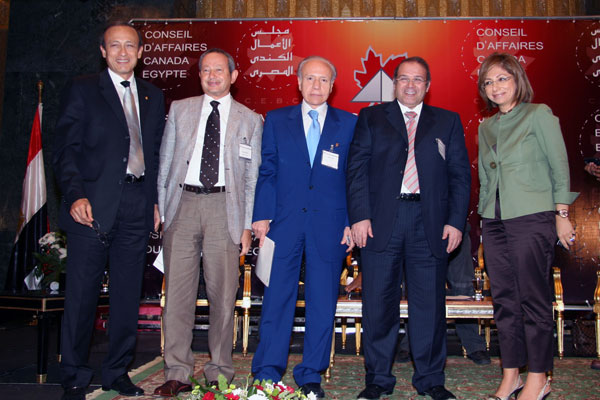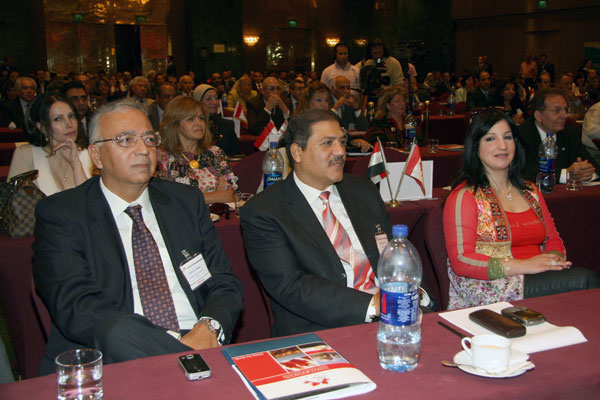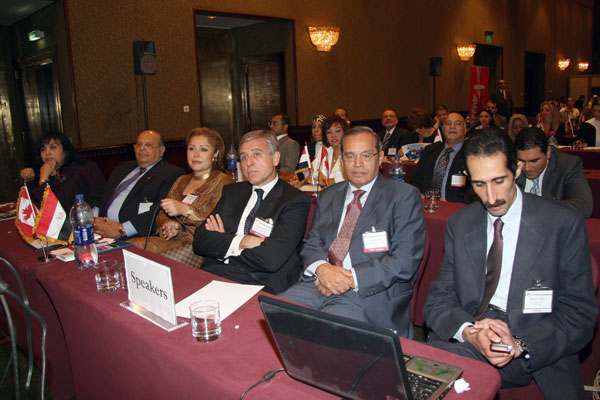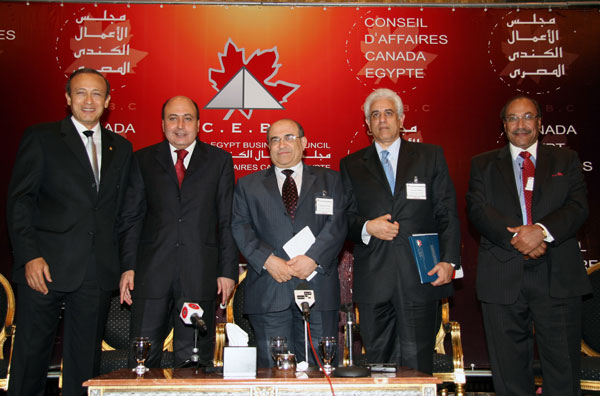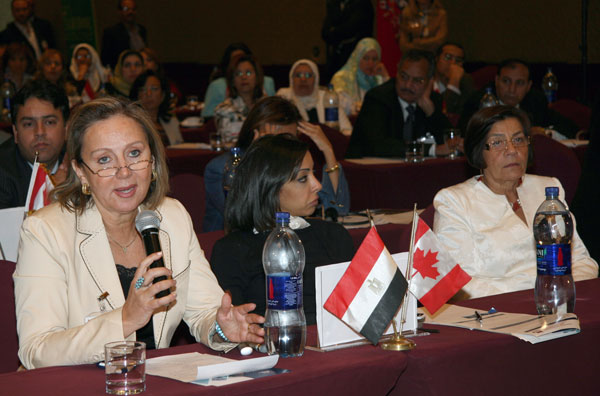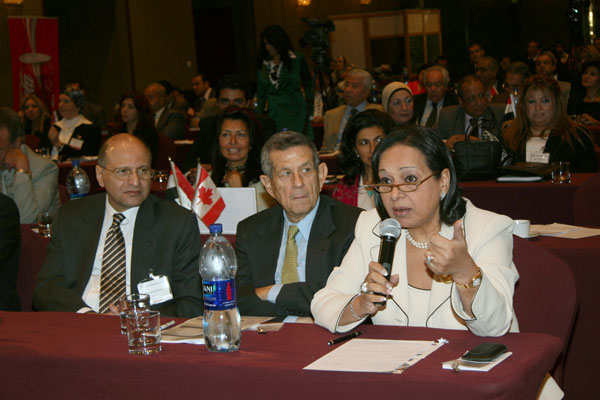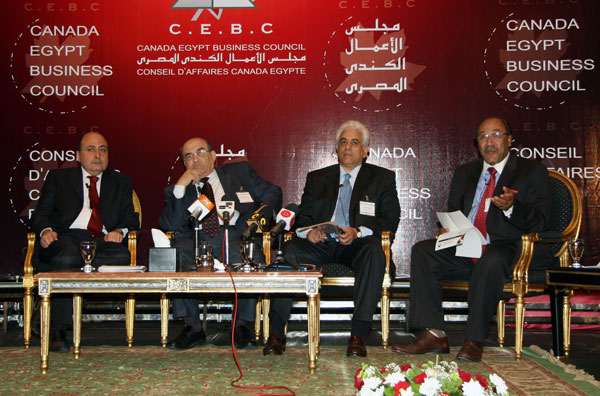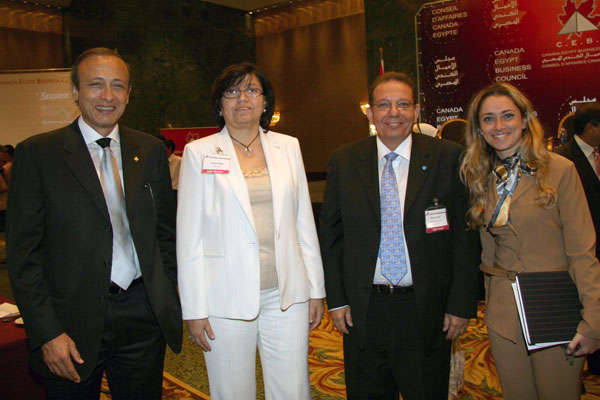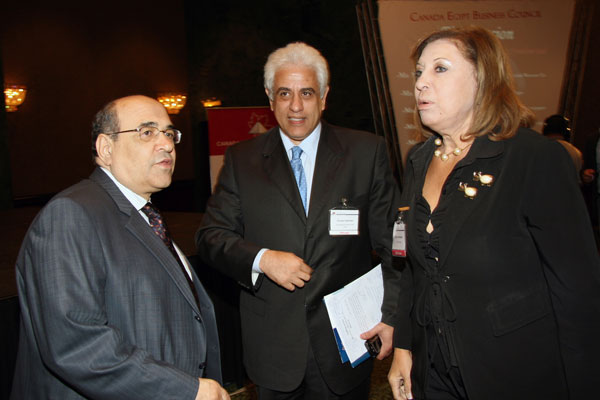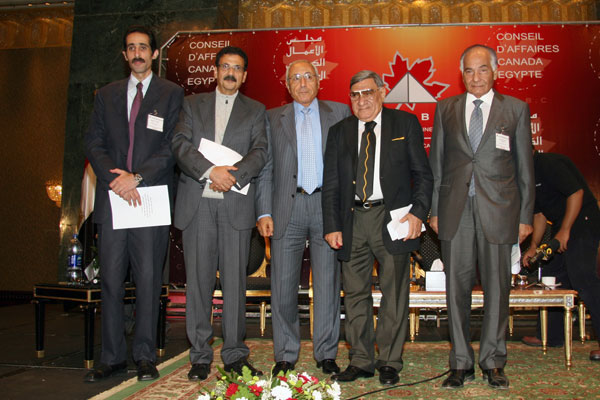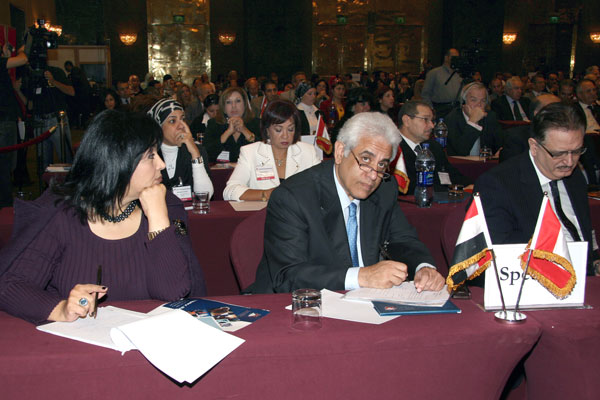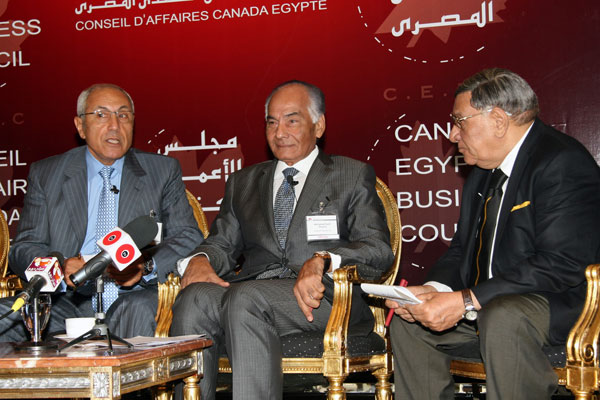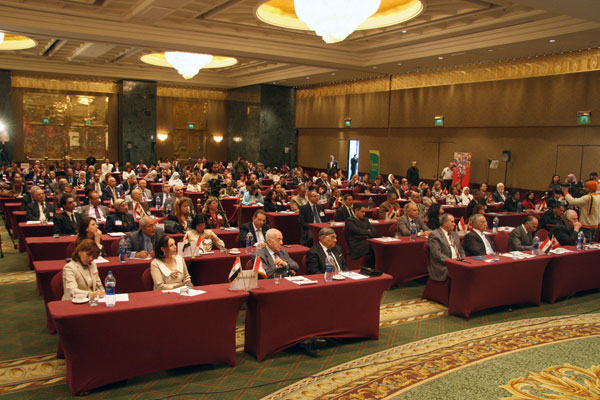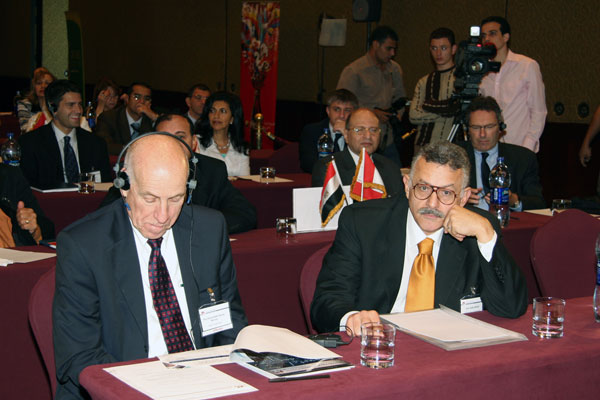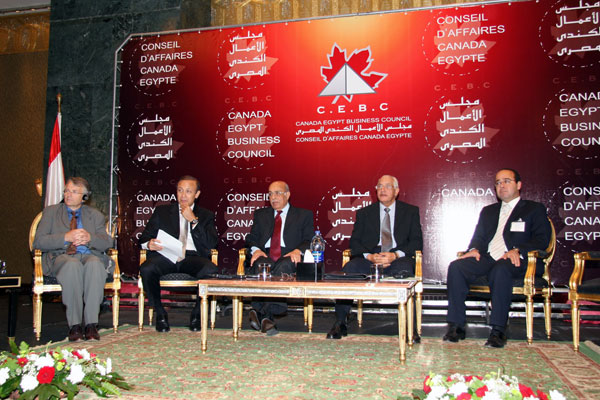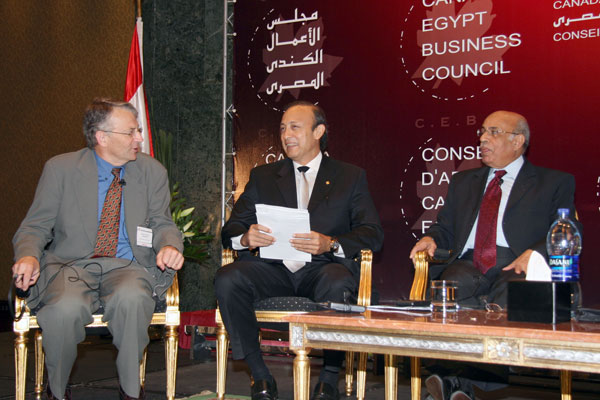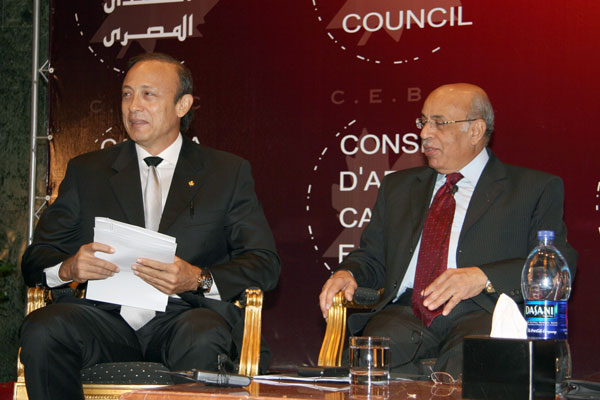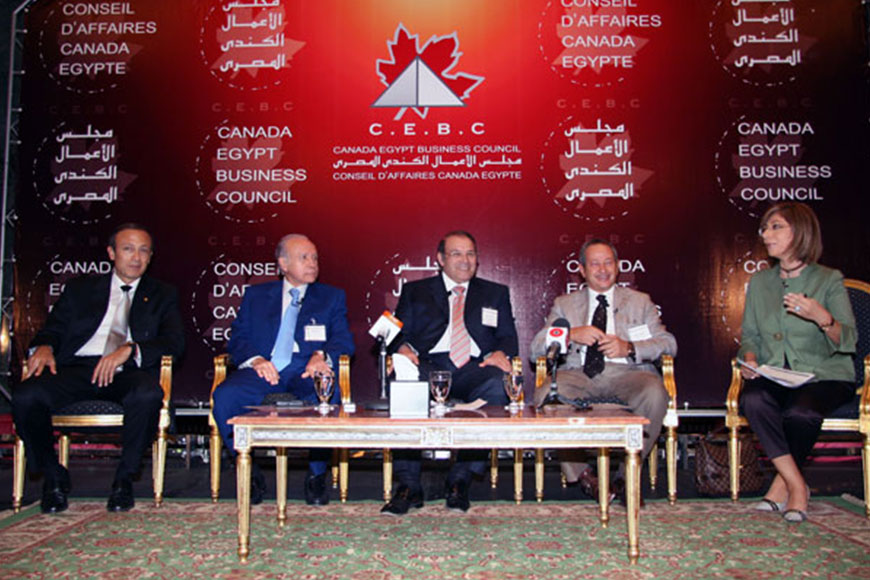
Date
Speaker(s)
Designation
Description
The Canada Egypt Business Council, CEBC hosted a one-day conference at the Grand Hyatt Hotel, incorporating a number of high profile business veterans, ministers, key government officials, journalists and TV anchors discussing the topic: “Media and the Private Sector…Partnership or Confrontation?”
The event debated on the nature of the relationship between the media and the private sector within the recent context of freedom and democratization.
Ms. Loula Zaklama, Member of the Board, Canada Egypt Business Council, commenced her speech by referring to media as a basic tool in progress of the public relations, stating that PR is considered as the spinal cord and the pivot of success or failure for any entity whether state, corporate or an individual one.
“Public Relation has played a major role in maintaining the credibility and trust between various entities and their targeted group of the society”, said Ms. Zaklama.
She also added that the relationship between media and PR is an integral relation depending upon mutual honesty, transparency and confidence reflected by sharing fundamental information among all stakeholders.
She further explained that the media jointly with the private sector have an imperative utility in supporting and developing the public relation professional practises in Egypt, stating that Egypt is highly acknowledged internationally and is among the key countries that practice PR in full professionalism. “Private Sector is a main component of Egypt’s economic reform process and any unconstructive criticism based on inaccurate information or misleading data could lead to restriction or limitation of private sector developmental practices and consequently investments”.
Finally, Ms. Zaklama affirmed that keeping the lines of communications open between all concerned parties represented by the business executives, government officials and media representatives is a vital essence through reinforcing dialogue and freedom of speech that may lead to constructing a sense of mutual confidence among all stakeholders and therefore the community as a whole.
Ms. Zaklama then gave the floor to Mr. Motaz Raslan, Chairman, Canada Egypt Business Council who commenced his opening remarks by outlining the role of information and media in reinforcing and promoting the public as well as private sectors development practices. “The great writer and novelist Ihsan Abdel Kodoos best articulated this when he said that information is the mirror of the society”, noted Mr. Raslan.
He then went on to explain that since the government of Egypt started adopting economic reform strategies and free market policies, high developmental impacts on all political, economic as well as media and information fronts were conquered. These developments are the fruits of successful proceedings taken by the State to provide the appropriate environment for progress and growth in addition to promoting transparency in the society in partnership with the private sector and civil society organizations.
He also added that the relationship between media and information on one side and development of Egypt on the other side has always been a principle relation that is primarily intended for the community’s benefit. He affirmed that this constructive relation should especially exit in a country as Egypt that suffers from a marked increase in the proportion of low-income people and lack of basic services, which needs intensive efforts to resolve all these problems and alleviate the suffering of the public.
Conversely, it was noted that this relationship changed during the recent years to draw some subjective impacts, having some pens focusing on the negatives away from the neutrality and objectivity. This was due to the presence of a few greedy and corrupted figures that fled abroad with bank funds as well as other examples of cases of bribery and influence peddling of illicit earnings. “However, such examples do not represent the majority of the society that is full of reputable figures, as well as other sincere investors. The real role of the media in any advanced society is the presentation of experiences in all its aspects and the clarification of the opinion and the other opinion and the shed of light on the pros to maximize the interest as well as the substantive exchange of negatives to avoid adverse effects on the society. This explains why a number of businessmen have contributed in the establishment and the publication of newspapers and possession of satellite channels, not only for the goal of reaping profit, but sometimes a wall blocking on one hand and to present their factual ideas and views on the other hand”, said Mr. Raslan.
Finally, the CEBC Chairman elaborated that the private sector and media are two sides of one coin and the more the relationship between the two parties is of mutual interest, the more prosperity and progress will be conquered. “Both parties are in the same boat and the lack of cooperation and the presumption of bad faith will lead to a loss for all stakeholders and in this case only the Egyptian public and future generations will pay the price”, concluded Mr. Raslan.
Mr. Raslan then introduced and welcomed H.E. Ambassador Ferry de Kerckhove, the newly appointed Canadian Ambassador to Egypt who started his speech by commending the ability and the outstanding effort of CEBC in promoting and bridging a mutual bilateral Egyptian Canadian relation aiming for the welfare of both countries. The Ambassador went on to explain the key role played by the media in informing the public and accordingly the business community through upholding the public’s interest by presenting accurate and sincere reporting.
He delve into the subject of democracy stating that it fundamentally relies on the exchanging of ideas among a responsible and well informed population. “Open and accountable media is indispensable to the development of a free and effective economy, specially in these days of global financial troubles in which the media can help in maintaining the level of stability by supporting and promoting investments as well as upholding transparency and honesty in the private sector”, noted the Canadian Ambassador.
H.E. Ambassador de Kerckove discussed his perspective on the role of the private sector stating that it should aim for protecting and endorsing the right of freedom of expression that is found in article 19 of the universal declaration of human rights as well as being an integral part of Canada’s foreign and domestic policy. He added that this right of freedom of expression should be subject to limitation and standards set by the private as well as the public sector inline with the international standards and legal norms.
“However the public sector should insure transparency of all its actions by embarking the application of mechanisms involving active information sharing and ongoing public consultation, such openness will allow and inform the public, in addition to endorsing a debate on issues concerning public, business, media, and society, that will raise credibility among the three sectors”, added the Ambassador.
Finally, Ambassador de Kerckhove noted that one of his prime objectives in Egypt is to develop an enabling environment in which Canadian companies feel confident in doing business in Egypt and hence boosting economic progress between the two countries.
Mr. Abdel Latif El Menawy, Head of the Egyptian News Sector, then took the podium highlighting the critical responsibility of the private sector as a key partner in upholding the attributes of recent economic expansion. He further emphasized that the community’s accord to this growing role should be more enhanced, and that this will not be attainable without the support of the media. “Media is always able to forge a common language that can clarify and highlight the constructive role of the private sector and convincing the public for their productive expansions”, said Mr. Menawy.
Mr. Menawy went on to outline Egypt’s leadership in endorsing the media industry in the Middle East, owning the first Arab Television, radio and newspaper, explaining that the Media is an industry that accommodates many voices and recently in Egypt the state is inviting the private sector to make further participation in the development of that industry. Such participation would raise the sense of competition among public and private owned media aiming for producing an effective media industry based on professionalism, credibility, endorsement of language of dialogue.
He finally noted that the sense of creditability and suspicion exclusion would be enhanced if the private sector owned media relinquish the mere goal of making profits in favor of delivering and supporting the noble message of the media that it based on constructive reporting and objectivity.
Mr. Menawy was followed by Dr. Ali El Din Helal, Information Secretary, The National Democratic Party who explored various aspects touching the relationship between private sector and media that involved “press independence versus accountability” and “objectivity versus profitability.”
He went on to elaborate that the entire stakeholders defiantly have one goal that is to have a selective Egyptian media entity whether owned by the state or the private sector. He emphasized that the relationship between the private sector and the media is closely linked to the extent and degree of economic and political reform that is currently existing in Egypt. “We cannot ignore the development that took place in the media sector, the establishment of private newspaper besides a diversity of Egyptian owned TV channels covering social, political aspects in addition to Drama and Comedy as well”, said Dr. Helal.
Moreover, Dr. Helal went on to criticize some press publications for spreading rumors and mayhem, which at that time jeopardized Egypt’s economic stability and dragged the stock market. He added that other foreign advanced countries models should be observed to benefit from solutions reached regarding private sector ownership to media in order to have an Egyptian media sector that guarantees professionalism, diversity, non-monopoly, and respect of the public through applying a code of ethics that complies with the traditions of the Egyptian society.
He also brought up the newly adopted media charter and said it would “regulate the media rather than restrain it.” Arab governments, led by Egypt and Saudi Arabia, adopted a satellite broadcasting charter that will entrench state control over broadcasts and curtail political expression on the airwaves over a region of around 300 million people. The Arab charter, which was criticized by both media members and human rights activists, bans airing material seen as undermining “social peace, national unity, public order and general propriety,” as well as criticizing religions or defaming political, national or religious leaders.
Concluding, Dr. Helal stressed on the importance of underpinning the sense of integrity and creditability among media, private, and public sectors that can further enhance Egyptian development attempts particularly in an age of communication revolution.
Dr. Helal was followed by the final keynote speaker of the opening session, H.E. Dr. Moufid Shehab, Minister of State for Legal and Parliamentary Councils, who started by delving into the impact of the direct and influential media on the Egyptian economy. He went on to outline that the private sector is embarking every field of development as the locomotive of the economy. “The investment enhancements that have been boosted recently according to implementing free market policies have increased opportunities for media and advertising to flourish. This is besides reinforcing fair competition among business enterprises that has contributed significantly to improve the quality of economic demonstration of companies in addition to public institutions”, said Dr. Shehab.
Moreover noted the Minister, Media is considered a basic tool in presenting all broad spectrums of ideas and facts through publishing or transmitting information. In fact it can shape and influence public culture by the direct impact of visual media. In addition, media has a major role in combating crisis through presenting warnings and shedding more lights on the problems before they occur as well as alleviating their negative impacts by offering needed information and accurate data.
He pointed out that media has become an important feature in strengthening the influence of some countries due to its clear impact on public opinion whether nationally or globally which in return, plays an influential role in the decision-making processes. His Excellency the Minister clarified that a free media should build awareness and criticism in a democratic society.
Dr. Shehab further stressed on the idea of establishing a national authority for organizing media practices in order to liberalize the Egyptian media and regulate that leading industry rather that restricting the freedom of Speech. “Such an authority can maintain the balance between the state, media and its receptors of the public. The integral cooperation among them in line with the constructive participation of the private sector can work on combating economic rumors and violations through the provision of accurate information. In fact, the government is currently negotiating a draft law covering all these aspects”, affirmed the Minister.
The Minister concluded his speech by pointing out that the responsibility of the media stems from its role as an altering and monitoring gear for the private sector activities. This is in addition to being a mean of forming social and political thought through interaction within the community and reflecting the different ideas and opinions and not being selective or partisan in its work.
First Session
Following the keynote speakers opening remarks, the first session, entitled “Media and the Private Sector…Freedom and Responsibility” was held to discuss whether the relationship between the media and the private sector is based upon “individualism”, driven by personal relations and utilizing media to accomplish specific objectives or based on serving the gracious message of media in objective informing. This session tackled a number of obstacles hindering the transparency needed to govern this relationship. Speakers of this session included Mr. Mohamed Farid Khamis, Chairman, Oriental Weavers Co., Mr. Mohamed Nosseir, Chairman, Alkan Holdings, Mr. Magdy El Galad, Editor-in-Chief, Al Masry Al Youm Newspaper and was moderated by the eminent TV Anchor, Mr. Moufid Fawzy.
Speakers from the private sector debated on the role of the media and the state in promoting democracy, which is the cornerstone of development. “Democracy has been always linked to freedom of speech that its main pillar is the media sector, while the private sector gearing agent is free and transparent competition that is based on objective monitoring of the media to the private sectors practices”, noted Mr. Farid Khamis. ”
Mr. Mohamed Nosseir explained that the recent media retreats on the businessmen reputation is related to a culture inherited since the 1960s era of socialism, which portrayed private entrepreneurship as an evil enterprise. However, added Mr. Nosseir, “Businessmen are not only the rich and wealthy industry or trade tycoons, but they include small entrepreneurs as well, that are all working for the goal of increasing productivity and hence contribute in the welfare of the Egyptian economy. ”
Mr. Nossier further argued that malpractices and corruption currently existing in the media sector. “There are some newspapers, that fabricate headlines first and then place stories so that they can sell,” he pointed out.
Once members of the press took the floor, accusations were flying back and forth between representatives of the media and the private sector. Momtaz El-Ott, Editor-in-Chief of the state-owned Akhbar Al-Youm newspaper, said that the private media took advantage of Egypt’s press freedom. “Private media is currently existing to serve their own interests by either polishing or smearing specific business people”, noted Mr. El-Ott.
On the other hand, Magdi El-Gallad, Editor-in-Chief of the privately owned daily newspaper Al-Masry Al-Youm accredited the predicament to a number of factors, primary among which is the lack of information and the cohering of power with wealth. He bewailed the appointment of businessmen to ministerial positions in an environment which lacks the transparency and regulation to reveal corruption. El-Gallad also called for the private sector to play a more organized and integral social role. Nevertheless, he did not deny that some newspapers do publish false information, adding that this issue could be resolved by increasing financial penalties on offending publishing houses. In addition, while some called for new regulations, Mr. El-Gallad finally added, “we do not need new laws; rather we need to activate existing laws.”
Second Session:
The next session entitled “The State…Outlook Forward the Media and the Private Sector” focused on finding a common ground for media and businessmen, through sharing experiences and demonstration of examples from other developed or developing societies. The session incorporated a number of speakers including Dr. Moustafa El Fekki, Chairman of the Foreign Affairs Committee, The People’s Assembly. In addition, Dr. Hossam Badrawi, Chair of the Education Committee, The National Democratic Party, Mr. Ossama Saraya, Editor-in-Chief, Al Ahram Newspaper were among the guest speakers of this session, which was moderated by Mr. Saad Hagras, Managing Editor, Al Alam Al Youm Newspaper.
Mr. Hagras explained that the media and the private sector consensus more than the aspect of “relationship versus confrontation”. “None of them live in an isolated island, no one can say that the media is corrupted and the businessmen are angels. In addition, he rejected accusing some parties of following Nasiriyah or communism, saying that Nasser died 38 years ago besides that the experience and age of Nasiriyah did not exceed the 10 years”, said Mr. Hagras.
Dr. Moustafa El Fekki, outlined his vision by saying that he cannot generalize the notion of condemnation to all business or the media practices. “There are businessmen who built their wealth from scratch and others collected through corruptions and malpractices”. He pointed out that most of the public consider the businessmen as greedy immoral people relating their concept to a few unethical ones that were spotted by the media. “Such public general notion necessitates the business sector to review what they are doing with greater transparency and accountability”, added Dr. El Fekki.
He lamented finding some pictures of corruption, extortion and profiteering as well a settling of account, which he described as practices far from the gracious message and code of the press. Dr. El Fekky finally called for encouraging freedom of dialogue that can explicit both the opinion and the other opinion and resolve this gab between media and business sector.
Dr. Hossam Badrawi portrayed the current phase as a transitional one in which the role of the State shifts from providing services to guaranteeing of justice. This phase may lead to composition of wealth as well as corruption. Besides, added Dr. Badrawy, the suspicious correlation between wealth and power should be overseen by certain rules governing this correlation.
Mr. Osama Saraya delivered a more optimistic speech when he affirmed that individual errors must not be considered as a general phenomenon. He added that capital and wealth should not be judged as a blunder or a fault. He finally called for joint contribution among all stakeholders to alter the general culture of the Egyptian society to shift form suspicion to credibility, leading to upholding the balance and sustaining development within the Egyptian society.
The Third Session:
The final session of the conference, “Investing in Media …An Agenda or Commercial Vehicle?” signified a great magnitude having an array of eminent guest speakers including, Mr. Naguib Sawiris, Chairman, Orascom Telecom, Mr. Hassan Rateb, Chairman, Al Mehwar Satellite Channel, Mr. Salah Diab, CEO, PICO and moderated by Ms. Lamees El Hadidy, Executive Chief Editor, Al Alam Al Youm Newspaper. The session focused on questioning the social, and personal aspects that led some businessmen establish media channels.
Egyptian prominent businessman Naguib Sawiris, outlined his experience as a co-owner of Egypt’s popular daily newspaper Al-Masry Al-Youm as well as the owner of OTV and ON channels. He discussed that he has decided in cooperation with other sincere business figures to establish a private owned newspaper based on objectivity and can differentiate between news and rumours.
“The newspapers that we have in Egypt are either public owned, based on clear-cut scheme which is what you read today, you will find tomorrow or on the other hand, the yellow press that lack magnitude. He pointed out that since Al-Masry Al-Youm was established and funded by business people, it was objective and did not serve any of their business interests. “I was attacked in Al-Masry Al-Youm”, noted Mr. Sawiris.
Mr. Salah Diab, a well-known Egyptian businessman and co-founder of Al-Masry Al-Youm, added that Al-Masry Al-Youm was always neutral in its reporting, as since establishment ownership was completely separated from management. “I have never interfered pushing any news to be published or hindering others”, said Mr. Diab.
While the speakers were discussing their successful experience in Al-Masry Al-Youm a hot question was posted by one of the journalists, accusing them of coming to the conference to celebrate their newspaper success.
El-Galad replied that Al-Masry Al-Youm is an undoubtedly sovereign of any personal or business interests, thus more booming and enjoying a credibility edge among other less objective newspaper that tried to attack it.
The speakers then delved into the subject of investing in media, stating that their investment in the media industry was not meant for profit gearing, however these investments were aiming for expressing their factual ideas and views despite their massive amount of loss that reached 70 million pounds in four years by Al-Mehwar channel.
Dr. Hassan Rateb owner of Al-Mehwar channel finally stated clearly that Al-Mehwar channel was established as a platform for circulating true data and objective reporting. “I would not allow my channel to become a place for ideas that do not form part of the ideology on which the channel was based, that is delivery the message and informing the public in complete transparency and objectivity”, concluded Dr. Rateb.
Following the sessions questions were posted by the audience covering major issues including the ways of protecting the public from false reporting, “Liberalization versus Responsibility”, “Freedom of Speech versus Uncrossed Red lines” as well as impact of media on public culture.
This conference would have been unattainable as a platform for presenting discussions without the contribution of the private sector and the support of the media representatives.


